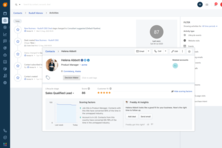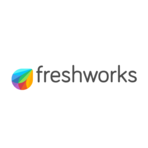CRM software for sales assists businesses of all sizes by organizing their customer contacts, managing sales pipelines and nurturing as well as automating several operational sales processes. These solutions work through a number of features such as sales analytics, reports, customizable dashboards and contact management. They target your most valuable assets—your customers—and assist with retaining them in the long run.
You simply cannot rely on an Excel spreadsheet to hold all customer information. This outdated method doesn’t allow for flexibility and scalability. The more your business grows, the more customers you have to keep track of. A spreadsheet won’t give you the room to thrive—in fact, it only hinders you. This is why many companies and enterprises choose to make use of CRM software solutions in their daily operations. Not only do they offer automation and organization but their features are capable of improving the potential of your marketing department also.
Three types of CRM software exist in the current market:
Operational CRM – focuses on operating processes to generate leads, nurture them into promising contacts and provide satisfactory customer service. The typical functionalities include sales automation, marketing automation and service automation.
Analytical CRM – refers to the ability to analyze customer data and gain helpful insights about the company’s performance. It gathers information, sets a methodical procedure in terms of organization and improves the overall effectiveness of the system.
Collaborative CRM – allows you to plan a strategy regarding customer information with other existing teams; this usually means getting feedback and insights on how to gain customer loyalty and improve sales.
Before deciding on which software vendor to subscribe to, it must be understood that CRM can cater to different types of business. For example, Zoho CRM is built for larger companies while Insightly and Hubspot CRM are catered for smaller businesses. However, most CRM solutions offer more or less the same features.

 Freshsales provides a fully-featured sales CRM that offers built-in phone and email support, AI-based lead scoring, visual sales pipelines, reports and dashboards, advanced workflow automations, and mobile apps.
Freshsales provides a fully-featured sales CRM that offers built-in phone and email support, AI-based lead scoring, visual sales pipelines, reports and dashboards, advanced workflow automations, and mobile apps.
CRM software for sales is used by businesses to improve their sales productivity and build stronger relationships with customers.
Most of the time, it’s the sales team that typically makes use of CRM software. Through implementing these solutions, organizations are better equipped to deal with the dynamic nature of customer service. They now have an enhanced ability to deal with rising problems in the business. However, these are not the only benefits you can receive from the system. You become more efficient and organized as well since CRM serves as both an organizational and management tool.
FreshSales is an example of customer relationship management software that is catered towards businesses of all sizes. Its system is integrated with features such as AI-based lead scoring, automated intelligent workflows and customizable visual reports.
Additionally, here are the core features people look for in CRM software solutions:
Contact management refers to the ability to merge all vital information in a customer database into a single, centralized location. It also allows you to separate them into groups according to categories, such as their interests, shopping behavior and even age. This makes it easier to conduct email marketing when introducing new products. You can choose to send personal communications which lets customers know how much research you’ve done on their behalf.
Otherwise known as lead scoring, this feature allows sales teams to optimize their sales opportunities. It consists of identifying customers most likely to convert. Considered as one of the most integral features of a CRM system, customer opportunity management lets you control and manage the sales process.
Lead management is designed to identify potential leads and nurture them into sales later on. Several practices, methodologies and applications are involved in this feature. Additionally, it provides you with crucial information needed to follow-up clients. This information is often based on their demographics. Overall, it lets you know how to get the right leads at the right time.
Another valued featured in CRM, sales analytics helps you determine your best course of action to improve your marketing strategies. It gathers a bevy of data that includes current trends, social media information, website traffic and more. You don’t have to blindly create marketing campaigns, hoping your customers will like it. Instead, you can have statistics backing your actions.
Project management might not be directly involved in engaging customers but it’s still a necessary feature to be included in CRM systems. It focuses on ensuring your team members can finish projects on a specified deadline without any errors or delays in the finished product. This is done through a series of steps such as planning, executing and completing tasks as soon as possible.
Benefits-wise, CRM software solutions offer a variety. Not only do you gain an organized system where every process is streamlined and automated but you can also experience better relationships with your customers. A successful business thrives on customer satisfaction and loyalty, after all. Through CRM software, organizations benefit from improved sales and an increase in leads.
Before, people depended on the paper-and-pen method to pass on messages and keep vital information in check. Others used spreadsheets or Excel. However, this proves detrimental in the long run, especially if your business is steadily rising in terms of sales and profit. Increased sales are the direct effect of having more customers. And if you’re not working to ensure customers stay loyal to your products or brand, then you can easily fall back to earlier periods where you didn’t gain as much. In order to avoid experiencing this, one of the best solutions to acquire is CRM software.
Here are the top benefits you gain from CRM tools:
Most CRM systems are cloud-based, which means they work best as web interfaces. Everything you upload online is saved in a safe storage space that you can access easily later.
You can generate reports based on selected time periods. For example, if you want to check a specific point of sale, you don’t have to manually check all receipts and purchase orders just to generate accurate information. Instead, the system does this for you—with the click of a finger, data from the first day of your business to now is made available.
Some might argue that the start-up of a CRM software solution is expensive. The benefits soon outweigh the costs in the long run. With new and improved methods of customer service and business management, you’re able to witness an increase in sales and profit.
Customers are the bloodline of every business out there. Without them, you wouldn’t even have a business in the first place. As such, the key to success lies in ensuring customers’ happiness. What a CRM does is it generates a centralized location for a database involving your clients such as their names, email addresses, contact information and more. By expressing how much you know about them, you easily gain favor in their eyes. In return, you retain a loyal customer.
Overall, CRM software is one of the best assets many people are investing in. They pay monthly for services that drastically improve the way their business flows—from streamlined processes to automated operations. Improved customer relationships, detailed reports and easy access to information online are just one of the few benefits businesses are experiencing right now with CRM. Each lead you nurture into a sale and each customer you gain the loyalty of is a step closer to a thriving business.